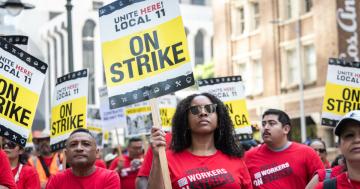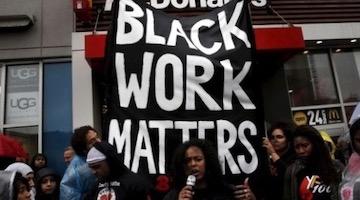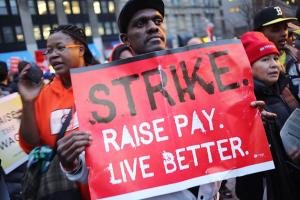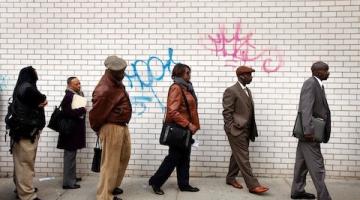The electoral appeal of anti-Black racism is a constant in the U.S. It is the perennial contradiction, producing political dynamics which ensure that the people's needs are never met and the ruling class have little opposition due to the lack of class consciousness.
The crisis of legitimacy afflicting the U.S. political system has produced a number of contradictions. One of the most glaring from this period is the contradiction between the struggle against racism in the United States and the growth in popular support for Medicare for All and a host of social welfare policies that have the potential of forming a truly class-conscious political program of the working class. Yes, you read that correctly. Such a contradiction exists despite assurances from the Bernie Sanders-wing of the Democratic Party that policies such as Medicare for All are anti-racist by definition. The contradiction was readily apparent when the millions who marched in the streets against racist policing in the summer of 2020 were not simultaneously armed with an economic and political program resembling that of the Sanders movement. That said, it was also quite clear that many of the millions who marched against racist policing were young workers and students of all races who overwhelmingly support the “progressive” wing of the Democratic Party.
This contradiction is non-antagonistic, meaning that it can be resolved among the people themselves through debate and peaceful struggle. The responsibility for the problem falls squarely at the feet of the U.S. ruling class of all political tendencies. More specifically, neoliberal Democrats for the past four decades have capitalized on the historic state repression of the Black liberation movement to sanitize the struggle against racism as part of its counterinsurgency agenda of neutralizing the most progressive force in U.S. history: Black America. The development of a Black political class loyal to capital in every way has been complimented by general lack of political leadership among the entirety of the U.S.-based working class.
Buried alongside the Black Liberation movement in the Democratic Party’s political graveyard is organized labor and a host of other social movements. As a result of the Democratic Party-led counterinsurgency war against the left, the word “populism” has been thrown around to describe a kind of apolitical class-only orientation that many believe has the potential to unite the working class in the United States. An organizational framework for how the politics of “populism” can achieve this goal has yet to surface. What has surfaced is a deep opposition to the neoliberal political establishment. While this is a welcome development, a renewed tendency on the U.S.-based Left to view the struggle against racism as purely a neoliberal project is not.
Any organization or force that claims leadership in the class struggle must take up the responsibility of addressing all of the contradictions standing in the way of a socialist future. Distinctions must be made between the neoliberal race-only politics of the Democratic Party and the revolutionary politics of race required to wage actual class struggle in the United States. These distinctions become even more critical given that the so-called far right has used the Democratic Party’s race-only, anti-worker orientation as an opportunity to merge pro-worker rhetoric with racism. As the late executive editor of Black Agenda Report, Glen Ford, prophetically pointed out about the 2016 presidential election, “The Democrats wanted to run on race as much as Trump did, because only a race-based campaign allows them to avoid any commitment to bread and butter issues – universal free healthcare, job and income security, free public higher education – that threaten the bi-partisan austerity regime (the Race to the Bottom).”
The Democratic Party’s race-only politics place a premium on the elevation of Black people and other “people of color” to a select few positions of status. This phenomenon is popularly known in consultant circles as “diversity.” Racism is relegated to a problem of the White Man’s Republican Party and its “basket of deplorables;” in other words, white people with racist ideas. Even when Democrats speak of institutional racism, rarely is the question of power factored into the equation. Race is separated entirely from class, allowing the Democratic Party to find ample political space to position itself as an anti-racist, pro-capitalist party—a real world impossibility.
A revolutionary approach to racism is rooted in political economy. Racism is quite clearly a class question. Take the condition of Black people in the United States. Black workers earn about 80 cents for every dollar that is paid to a white worker regardless of educational status. The situation is even worse for Black men, who make around 56 cents for every dollar paid to a white male worker. Black workers experience unemployment at twice the rate of white workers and this disparity remains static during both economic crises and periods of “recovery.”
Race-based discrimination is rampant in every aspect of Black life, especially in the realm of finance. How quicky it has been forgotten that financiers at Wells Fargo called Black Americans “mud people” and their predatory subprime mortgages “ghetto loans” while they were looting what little wealth existed in the Black community in the lead up to the 2007-08 economic crisis. Mass incarceration and the police occupation of Black communities has only added fuel to the fire of a rapid descent to the economic bottom for Black families. Black wealth is trending toward zero in the coming decades and economic precarity has further exacerbated longstanding disparities in healthcare, education, and life expectancy in comparison to white America.
The condition of Black workers in the United States is a reminder that any form of class struggle that refuses to recognize the National Question is destined to fail. This was the experience of the First and Second International prior to the victory of the Russian Revolution in 1917. The National Question was a leading force in Vladimir Lenin and the Bolsheviks’ program for socialist construction. It asserted that the struggle of the workers to overthrow capitalism was completely congruent with the struggle of oppressed nations fighting to throw off the shackles of colonialism and imperialism. The National Question’s applicability to the struggle of Black people as a nation within a nation led Lenin himself to declare that “all Communist parties should render direct aid to the revolutionary movements among the dependent and underprivileged nations (for example, Ireland, the American Negroes, etc.) and in the colonies” (emphasis my own).
Lenin’s theses on the National and Colonial Questions have been incredibly important to the development of the class struggle both past and present. Understanding of the National Question influenced the Communist Party in the United States to take up the fight against Jim Crow as a crucial component of its political program. Numerous anti-colonial movements took up the cause of socialism as a result of Lenin’s framework on the National Question. This includes the heroic struggles against imperialism from Korea and Vietnam to Ghana and Grenada. Furthermore, U.S. capitalism and its settler colonial roots have entered an acute stage of imperialist decline which only enhances the relevance of the National Question. The condition of Black America and that of countless other oppressed nations demonstrate that the National Question must be applied to the current conditions of class struggle within the U.S.’s colonial borders.
It is thus imperative that those who claim leadership in the struggle against global capitalism do not cede the National Question to neoliberal ruling elites who understand fully the importance of racism in thwarting the fight for socialism. The marriage between neocon servants of the ruling class such as Bill Kristol and Joe Biden is an outgrowth of the Cold War and the War on Terror’s policy of full spectrum imperialist domination. Neoliberals in the non-profit/NGO industrial complex treat the question of race as little more than an operation in their overall design to neutralize the left domestically and globally. The task ahead of us is to develop the organizational and ideological coherence capable of ensuring renewed interest in the word “socialism” finds expression in a political program that has as one of its foundational principles the material struggle against white supremacy and empire.
Danny Haiphong is a contributing editor to Black Agenda Report and co-author of the book “American Exceptionalism and American Innocence: A People's History of Fake News- From the Revolutionary War to the War on Terror.” He can be reached at wakeupriseup1990@gmail.com. Follow his work on Twitter @SpiritofHo and on YouTube as co-host with Margaret Kimberley of Black Agenda Report Present's: The Left Lens. You can support Danny on Patreon by clicking this link.



















